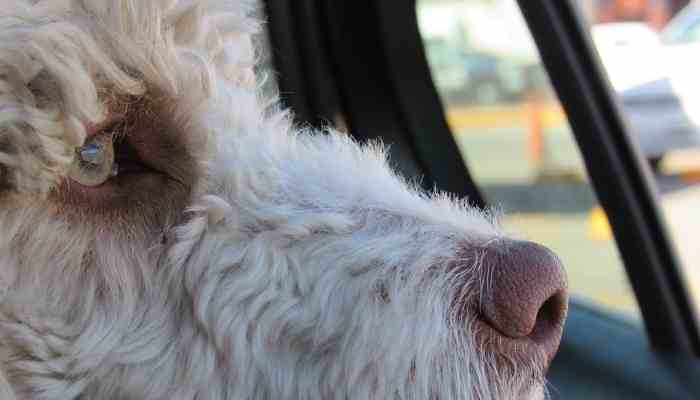Anxiety is a normal and quite common behaviour in dogs. Just like humans, dogs experience stress and anxiety. Dog anxiety may affect all breeds differently. All dogs may experience anxiety from time-to-time but if this condition in your pet is left unchecked or untreated, this can lead to unhealthy and potentially dangerous behaviours within dogs. Being a pet-owner how do you know if your dog has anxiety? To help you better understand what is dog anxiety, it’s necessary to comprehend with the common causes, nuances and signs of anxiety in dogs.
Causes Of Dog Anxiety
There are several causes of dog anxiety and some of the most common causes are:
1- Separation anxiety is quite common in dogs that are left home alone or separated from their family members. According to an estimate, around 14% of dogs are affected with this anxiety. Dogs with separation anxiety sometimes show undesirable behaviours such as destroying furniture and furnishings, excessive barking, urinating and defecating in the house, etc.
2- Fear-related anxiety in dogs is caused by different sorts of stimuli like loud noises, new or strange environments, strange people or animals, visual stimuli like umbrellas or hats, a visit to vet office, etc. Some dogs may response only brief reactions to these stimuli while anxious dogs suffer more.
3- As compared to young ones, age-related anxiety is common in senior dogs. With the passage of time memory, learning, perception, and awareness start to decline because of cognitive dysfunction syndrome (CDS). Dogs with CDS condition will become confused and anxious.
4- Any painful condition or illness in dogs can lead to the development of anxiety and fear.
5- Until the age of 14, when dogs are deprived of social and environmental exposure, they habitually may experience anxiety or fear.
Symptoms Of Dog Anxiety
Though, the symptoms of dog anxiety is harder to recognize but your pet might try different acts to tell you his condition like tucking his tail, salivating, pushing his ears back, lifting his front paw, cowering or hiding, panting, trembling, etc. If you are not sure that your dog has anxiety or not, take a look of following important symptoms that will help you better understand this condition.
– Urinating or defecating in the house
– Aggression
– Repetitive or compulsive behaviours
– Pacing or restlessness
– Destructive behaviour
– Excessive whining
– Excessive panting or drooling
– Excessive barking and howling
– Depression
– Repetitive digging or scratching
– Excessive licking
– Trembling or shaking
Depending on the situation, some of these symptoms can be triggered directly or indirectly and may be induced as the result of occasional anxiety-causing events. If these symptoms are left untreated, any of these can become recurrent and can result in more serious issue.
Treatments Of Dog Anxiety
If your pet is suffering from anxiety, the best way to treat your pup is to talk with your veterinarian as he can rule out the real cause and type of anxiety and the things, situations or conditions that trigger it. He also helps you determine if the anxiety of your pet is simply situational or has become a recurrent issue. By assessing any other medical conditions that can cause anxiety symptoms in your dog, your veterinarian will make a treatment plan for your pet. It is quite obvious that excessive anxiety in dogs is usually caused by a variety of factors, so your vet will give you a specific plan to change your dog’s underlying emotional condition and guide you to treat it with training and preventive strategies. For serious anxiety disorder, your veterinarian may recommend you medications or natural therapies to bring your pup back to his happy and normal life. Occasionally, veterinarians will prescribe SSRIs and antidepressants for dogs with anxiety, including fluoxetine and clomipramine.
Different Ways To Relax Your Dog:
Before shelling out for any vet recommended practices, products or medications that promise to relax your dog’s anxiety, all you have to do is to consider how you can make your pup feel calmer. If your pet is experiencing anxiety, don’t get panic as just like people, there are plenty of ways that can calm and sooth your furry friends. Every dog is different, so being a pet-owner you have to follow different ways that help manage and improve your dog’s anxiety and stress.
Some simple strategies that really work
– If the cause of your pet’s stress seems to stem from separation anxiety, re-examine your routine. Give him a predictable routine that helps him to anticipate when he will go out for a walk, get to eat or spend time to play with you.
– You can play some music like soft rock, reggae to jazz, etc. Actually, playing music can clam your pup to some extent.
– Don’t show your dog that you are leaving him alone, whether for a short or long time span.
– Pamper your dog and give him hugs and kisses before leaving.
– Feed your dog with his favourite treats before you leave.
– Create a safe environment or place where your pup will feel secure in your absence, whether it be a special corner with a dog bed or an open crate.
– You can hire a doggy walker or a pet sitter, so your pet will not feel lonely at home and there is someone to look after your pet in your absence.
– Try to treat your pup with a massage as this can sooth his body.



